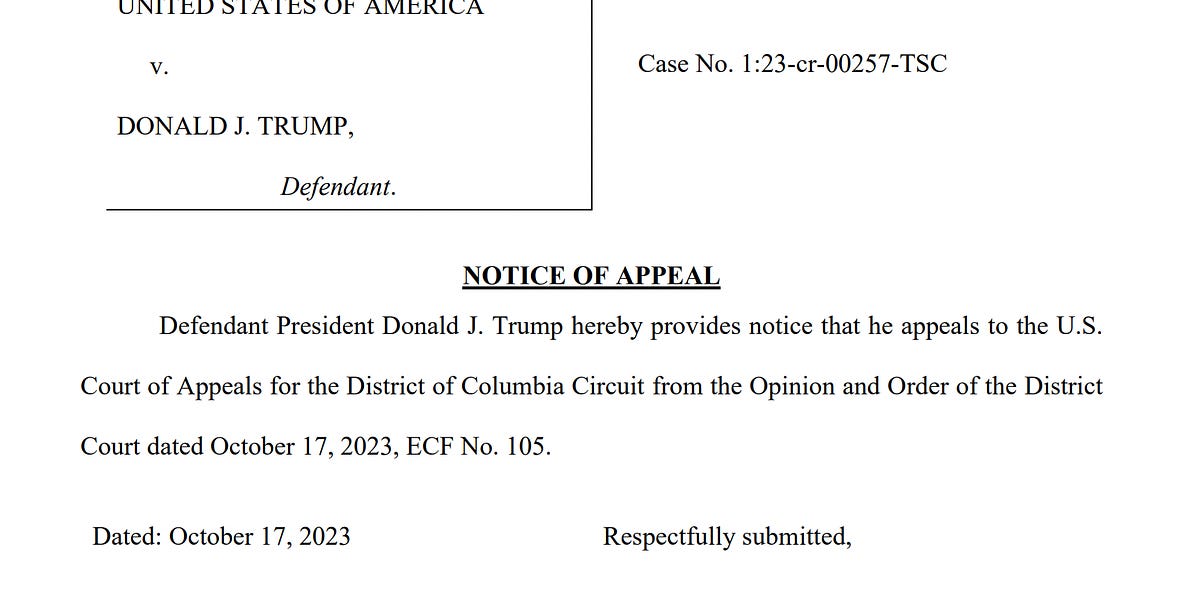Sixties Fan
Diamond Member
- Mar 6, 2017
- 57,278
- 10,913
- 2,140
- Thread starter
- #661
It turns out it wasn’t just a bad day for Trump, as I captioned my column Thursday night. It was a bad week. A really bad week.
After Sidney Powell’s guilty plea, there was Kenneth Chesebro’s plea. His was to a felony charge of filing false information, but like Powell, he spends no time in prison and will be eligible under Georgia’s first-time offender provision to have his record expunged after he completes his probationary sentence successfully.
Some folks have expressed concerns about these “light” sentences. Keep your eyes on the prize here. The goal is to hold folks accountable and to keep flipping lower level defendants against ones who are higher up the food chain, more culpable. Powell and Chesebro, both lawyers, have just admitted in open court that they committed crimes in connection with the Georgia election. Both have given prosecutors taped statements. We don’t know what’s in them, but prosecutors found sufficient value in the evidence each defendant had to offer to extend very favorable plea deals. Both Powell and Chesebro are obligated to testify truthfully at trial—if they don’t, they lose their deals, which is a pretty good guarantee they won’t back pedal.
Donald Trump isn’t the only highly culpable defendant in the Fulton County case, even if he’s the most important target of the prosecution. Chesebro, a Harvard educated lawyer, was the architect behind the fake electors scheme. In one memo he authored, Chesebro acknowledged that he was promoting a “controversial strategy” that even the Supreme Court, with its conservative supermajority, would “likely” reject. He suggested that there were political, as opposed to legal, reasons to move forward with it. The plan was discussed in conversations that took place among the lawyers. There is likely more to it than what is publicly known, and interestingly, Chesebro’s plea obligates him to turn over documents to the government as well as to testify. We don’t know what might be in his emails and text messages or who he might he be able to offer additional evidence against. The possibilities include at least Rudy Giuliani, John Eastman, Jeffrey Clark, and Jenna Ellis (who, with her publicly expressed grievance over paying her own legal fees, looks like she could be poised for a guilty plea of her own as the case moves forward). They’re all candidates for Chesebro to cooperate against. In other words, it’s not just about obtaining additional testimony against Trump, it’s also about obtaining testimony to encourage defendants who are closer to Trump to plead guilty as well.
Chesebro wrote an entire series of memos in 2020 that acted as road maps for the fake slates of Trump electors in each state. He did that in Georgia, of course, but that wasn’t the only state where the Trump campaign ran the fake electors ploy. Chesebro acknowledged in court that he “created and distributed false Electoral College documents” to Trump operatives in Georgia and other states, and that he worked “in coordination with” the Trump campaign (emphasis added). So, it’s easy to see how his testimony could help not just Fani Willis, but Jack Smith too. “The defendant provided detailed instructions to co-conspirators in Georgia and other states,” a prosecutor told the Judge on Friday when detailing Chesebro’s conduct. Chesebro had to acknowledge that the prosecution’s statement was correct as part of his colloquy with the Judge. Before accepting a guilty plea, the judge must ensure that a defendant understands what he’s pleading guilty to and is doing so voluntarily. That means Chesebro can’t walk back the “other states” part of what he knows about.
There’s an additional advantage to obtaining guilty pleas from both Powell and Chesebro, and it’s more bad news for Trump. There will be no early trial, no opportunity for other defendants to get a preview of Fani Willis’ case. Willis is down from 19 defendants to 16 defendants, and she hasn’t even struck a jury yet. Her consistent position has been that she wants to try all defendants together—Powell and Chesebro were only going apart from the others because they’d made speedy trial demands. Willis has a strong argument that the remaining defendants should be tried together, and lo and behold, both the Judge and Donald Trump have some empty time on their hands in the next few months before Jack Smith’s case against Trump goes to trial in Washington, D.C., in March.
The three guilty pleas Willis has obtained—Scott Hall, who was part of the Coffee County voting machines scheme pled earlier; in fact, his plea likely played a role in Powell’s plea, since she was involved in it too—put pressure on downstream defendants. More of the defendants charged in the Coffee County portion of the RICO conspiracy are likely to seek deals. Other defendants who have anything to offer are almost certainly thinking about it. As we discussed on Thursday, no one wants to be left standing when the music stops. Does Mark Meadows want to be sitting at the table with Donald Trump when the jury hears the evidence or would he prefer to be on the witness stand during the government’s case? I suppose that depends on how much of the rest of his life the 64-year-old Meadows, who gave up a safe seat in Congress to serve as Trump’s fourth chief of staff, wants to spend in Georgia.
Steve Sadow, Trump’s new lead trial lawyer in Georgia, had this to say after Sidney Powell’s plea: “Assuming truthful testimony in the Fulton County case, it will be favorable to my overall defense strategy.” Of course, what else can Trump’s lawyer say? But this case will end up in the predictable place with Trump pointing his finger at the lawyers (at least some of whom he hasn’t paid) and claiming they took advantage of him. Trump is always the victim when it suits him. Fani Willis will be ready.
As if the Fulton County case wasn’t enough bad news for Trump, Friday, the Judge hearing the civil fraud case in New York, Judge Arthur Engoron, was boiling when he learned that despite his gag order, Trump failed to remove from his website a social media post directed at the Judge’s clerk. The Judge threatened Trump with sanctions including prison. Trump’s lawyers said that the failure to remove the item was an accident.
The Judge ended up fining Trump $5,000.00, based largely on the representation that what happened was an inadvertent error. Trump had removed the post from Truth Social, but failed to take it off of his website. Far from being a slap on the wrist, as some complained, the misstep gave the Judge a chance to issue a final warning to Trump. In his order, he wrote, “Donald Trump has received ample warning from this Court as to the possible repercussions of violating the gag order. He specifically acknowledged that he understood and would abide by it. Accordingly, issuing yet another warning is no longer appropriate; this Court is way beyond the “warning” stage…Make no mistake: future violations, whether intentional or unintentional, will subject the violator to far more severe sanctions, which may include, but are not limited to, steeper financial penalties, holding Donald Trump in contempt of court, and possibly, imprisoning him.” Trump is on notice.
The Judge is making a record. If Trump steps out of line again and the judge sanctions him, possibly imprisons him, prosecutors will be able to argue on appeal that the court did everything it possibly could before taking more serious steps. This sort of “progressive discipline” adds an additional warning to Trump on the record, and makes it easier to uphold more significant steps the Judge made choose to take if there’s a future transgression.
It’s impossible to close out the week without talking about House Republican’s failure to elect a Speaker. Increasingly it seems clear we are no longer a two-party country. We are a three- or four-party country: Democrats on one side and the two or three different parties housed under the Republican umbrella. The MAGA party is a pro-chaos party, straight out of Steve Bannon’s playbook. Whatever their name implies they’re about, they have as little to do with making America great again as Trump’s “stop the steal” slogan had to do with protecting election integrity. Although the Liz Cheneys and Adam Kinzingers—the never Trumpers—are long gone, perhaps the remaining few Republicans who believe in country over party just enough to want to avoid a government shutdown (current funding runs out on November 17) with volatile situations in both Eastern Europe and the Middle East, will consider a temporary alliance with Democrats to ensure we make it through the current international and national crisis. New York Congressman Dan Goldman had this to say Saturday morning.
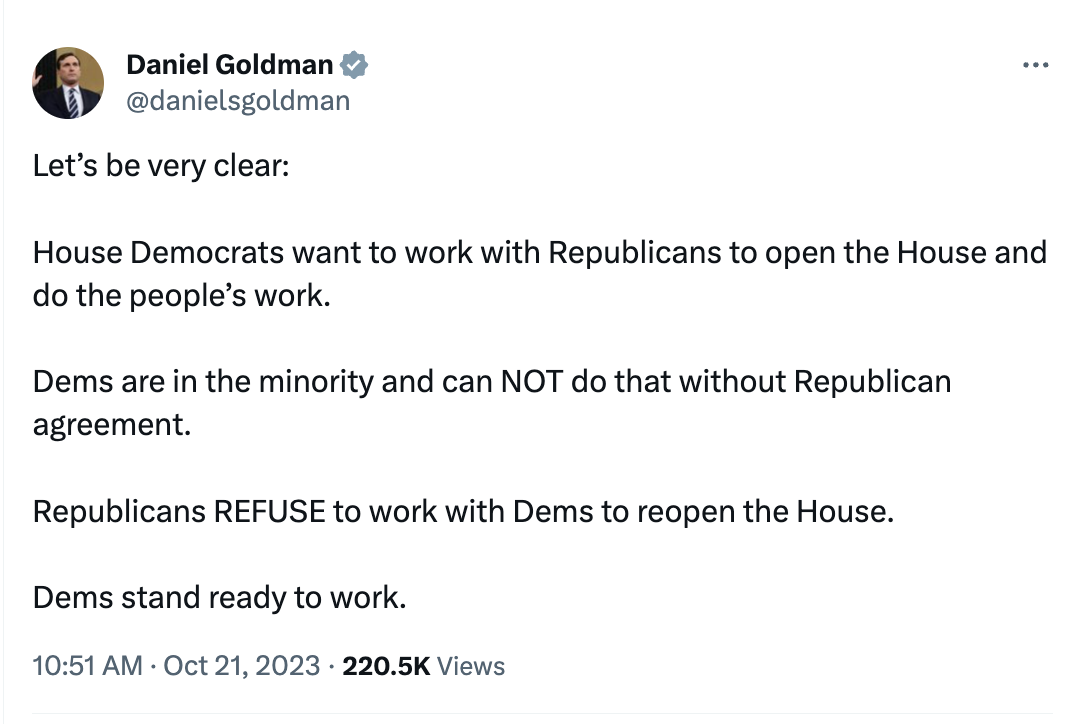
The blame for the situation we’re in is squarely on the Trump-Republicans and anyone who enables them. Trump’s allies are endangering national security. That’s an important point to focus on now, as we begin to discuss the upcoming elections. Who makes you feel safer? It’s not the folks who can’t even pick a leader in a moment of crisis.
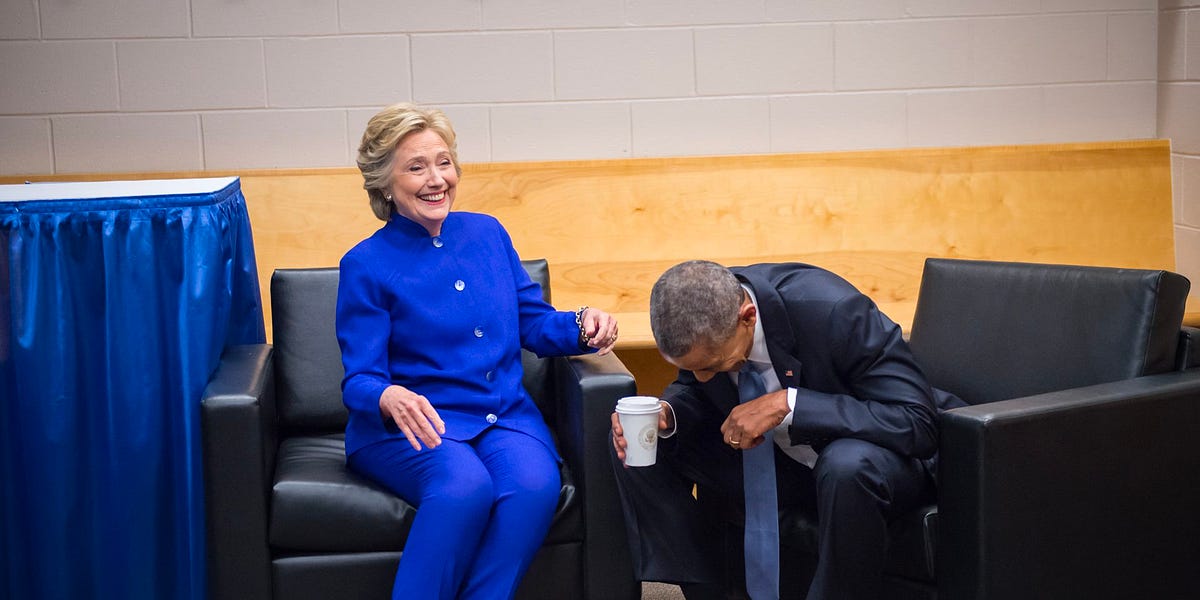
 joycevance.substack.com
joycevance.substack.com
After Sidney Powell’s guilty plea, there was Kenneth Chesebro’s plea. His was to a felony charge of filing false information, but like Powell, he spends no time in prison and will be eligible under Georgia’s first-time offender provision to have his record expunged after he completes his probationary sentence successfully.
Some folks have expressed concerns about these “light” sentences. Keep your eyes on the prize here. The goal is to hold folks accountable and to keep flipping lower level defendants against ones who are higher up the food chain, more culpable. Powell and Chesebro, both lawyers, have just admitted in open court that they committed crimes in connection with the Georgia election. Both have given prosecutors taped statements. We don’t know what’s in them, but prosecutors found sufficient value in the evidence each defendant had to offer to extend very favorable plea deals. Both Powell and Chesebro are obligated to testify truthfully at trial—if they don’t, they lose their deals, which is a pretty good guarantee they won’t back pedal.
Donald Trump isn’t the only highly culpable defendant in the Fulton County case, even if he’s the most important target of the prosecution. Chesebro, a Harvard educated lawyer, was the architect behind the fake electors scheme. In one memo he authored, Chesebro acknowledged that he was promoting a “controversial strategy” that even the Supreme Court, with its conservative supermajority, would “likely” reject. He suggested that there were political, as opposed to legal, reasons to move forward with it. The plan was discussed in conversations that took place among the lawyers. There is likely more to it than what is publicly known, and interestingly, Chesebro’s plea obligates him to turn over documents to the government as well as to testify. We don’t know what might be in his emails and text messages or who he might he be able to offer additional evidence against. The possibilities include at least Rudy Giuliani, John Eastman, Jeffrey Clark, and Jenna Ellis (who, with her publicly expressed grievance over paying her own legal fees, looks like she could be poised for a guilty plea of her own as the case moves forward). They’re all candidates for Chesebro to cooperate against. In other words, it’s not just about obtaining additional testimony against Trump, it’s also about obtaining testimony to encourage defendants who are closer to Trump to plead guilty as well.
Chesebro wrote an entire series of memos in 2020 that acted as road maps for the fake slates of Trump electors in each state. He did that in Georgia, of course, but that wasn’t the only state where the Trump campaign ran the fake electors ploy. Chesebro acknowledged in court that he “created and distributed false Electoral College documents” to Trump operatives in Georgia and other states, and that he worked “in coordination with” the Trump campaign (emphasis added). So, it’s easy to see how his testimony could help not just Fani Willis, but Jack Smith too. “The defendant provided detailed instructions to co-conspirators in Georgia and other states,” a prosecutor told the Judge on Friday when detailing Chesebro’s conduct. Chesebro had to acknowledge that the prosecution’s statement was correct as part of his colloquy with the Judge. Before accepting a guilty plea, the judge must ensure that a defendant understands what he’s pleading guilty to and is doing so voluntarily. That means Chesebro can’t walk back the “other states” part of what he knows about.
There’s an additional advantage to obtaining guilty pleas from both Powell and Chesebro, and it’s more bad news for Trump. There will be no early trial, no opportunity for other defendants to get a preview of Fani Willis’ case. Willis is down from 19 defendants to 16 defendants, and she hasn’t even struck a jury yet. Her consistent position has been that she wants to try all defendants together—Powell and Chesebro were only going apart from the others because they’d made speedy trial demands. Willis has a strong argument that the remaining defendants should be tried together, and lo and behold, both the Judge and Donald Trump have some empty time on their hands in the next few months before Jack Smith’s case against Trump goes to trial in Washington, D.C., in March.
The three guilty pleas Willis has obtained—Scott Hall, who was part of the Coffee County voting machines scheme pled earlier; in fact, his plea likely played a role in Powell’s plea, since she was involved in it too—put pressure on downstream defendants. More of the defendants charged in the Coffee County portion of the RICO conspiracy are likely to seek deals. Other defendants who have anything to offer are almost certainly thinking about it. As we discussed on Thursday, no one wants to be left standing when the music stops. Does Mark Meadows want to be sitting at the table with Donald Trump when the jury hears the evidence or would he prefer to be on the witness stand during the government’s case? I suppose that depends on how much of the rest of his life the 64-year-old Meadows, who gave up a safe seat in Congress to serve as Trump’s fourth chief of staff, wants to spend in Georgia.
Steve Sadow, Trump’s new lead trial lawyer in Georgia, had this to say after Sidney Powell’s plea: “Assuming truthful testimony in the Fulton County case, it will be favorable to my overall defense strategy.” Of course, what else can Trump’s lawyer say? But this case will end up in the predictable place with Trump pointing his finger at the lawyers (at least some of whom he hasn’t paid) and claiming they took advantage of him. Trump is always the victim when it suits him. Fani Willis will be ready.
As if the Fulton County case wasn’t enough bad news for Trump, Friday, the Judge hearing the civil fraud case in New York, Judge Arthur Engoron, was boiling when he learned that despite his gag order, Trump failed to remove from his website a social media post directed at the Judge’s clerk. The Judge threatened Trump with sanctions including prison. Trump’s lawyers said that the failure to remove the item was an accident.
The Judge ended up fining Trump $5,000.00, based largely on the representation that what happened was an inadvertent error. Trump had removed the post from Truth Social, but failed to take it off of his website. Far from being a slap on the wrist, as some complained, the misstep gave the Judge a chance to issue a final warning to Trump. In his order, he wrote, “Donald Trump has received ample warning from this Court as to the possible repercussions of violating the gag order. He specifically acknowledged that he understood and would abide by it. Accordingly, issuing yet another warning is no longer appropriate; this Court is way beyond the “warning” stage…Make no mistake: future violations, whether intentional or unintentional, will subject the violator to far more severe sanctions, which may include, but are not limited to, steeper financial penalties, holding Donald Trump in contempt of court, and possibly, imprisoning him.” Trump is on notice.
The Judge is making a record. If Trump steps out of line again and the judge sanctions him, possibly imprisons him, prosecutors will be able to argue on appeal that the court did everything it possibly could before taking more serious steps. This sort of “progressive discipline” adds an additional warning to Trump on the record, and makes it easier to uphold more significant steps the Judge made choose to take if there’s a future transgression.
It’s impossible to close out the week without talking about House Republican’s failure to elect a Speaker. Increasingly it seems clear we are no longer a two-party country. We are a three- or four-party country: Democrats on one side and the two or three different parties housed under the Republican umbrella. The MAGA party is a pro-chaos party, straight out of Steve Bannon’s playbook. Whatever their name implies they’re about, they have as little to do with making America great again as Trump’s “stop the steal” slogan had to do with protecting election integrity. Although the Liz Cheneys and Adam Kinzingers—the never Trumpers—are long gone, perhaps the remaining few Republicans who believe in country over party just enough to want to avoid a government shutdown (current funding runs out on November 17) with volatile situations in both Eastern Europe and the Middle East, will consider a temporary alliance with Democrats to ensure we make it through the current international and national crisis. New York Congressman Dan Goldman had this to say Saturday morning.

The blame for the situation we’re in is squarely on the Trump-Republicans and anyone who enables them. Trump’s allies are endangering national security. That’s an important point to focus on now, as we begin to discuss the upcoming elections. Who makes you feel safer? It’s not the folks who can’t even pick a leader in a moment of crisis.

More Bad News for Trump
It turns out it wasn’t just a bad day for Trump, as I captioned my column Thursday night. It was a bad week. A really bad week. After Sidney Powell’s guilty plea, there was Kenneth Chesebro’s plea. His was to a felony charge of filing false information, but like Powell, he spends no time in...
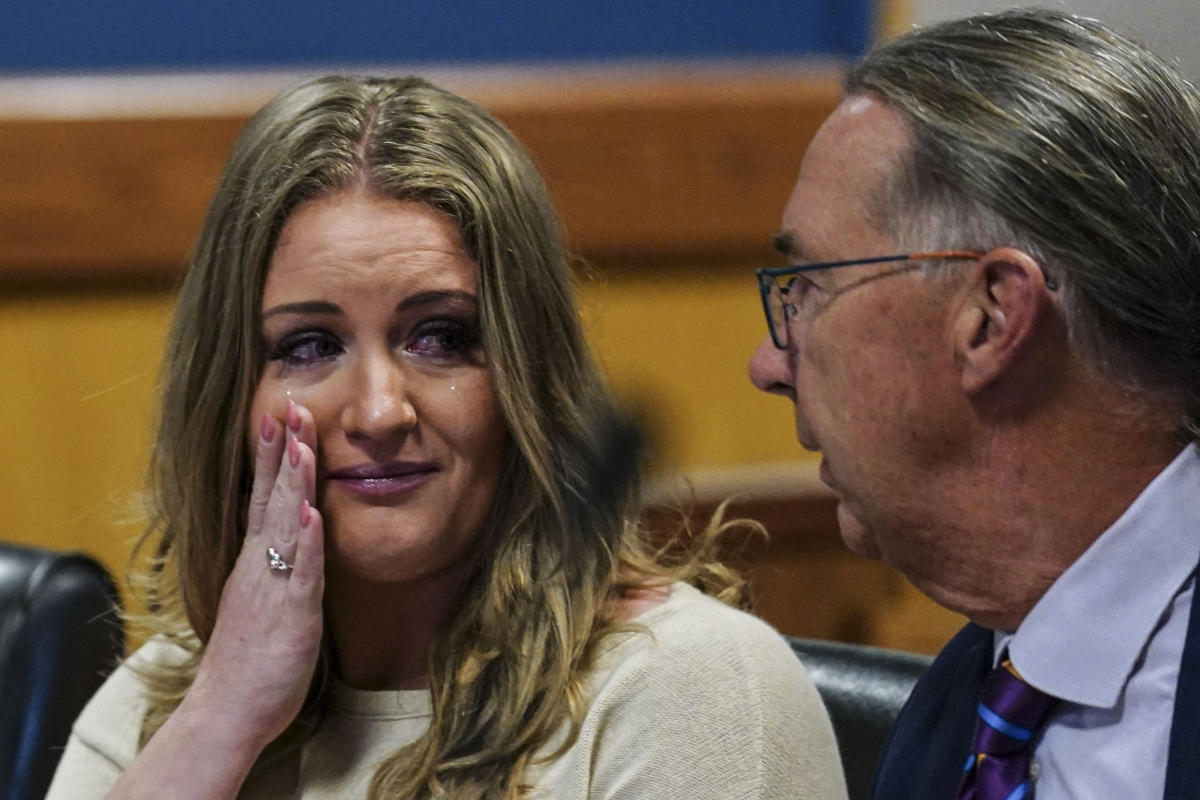
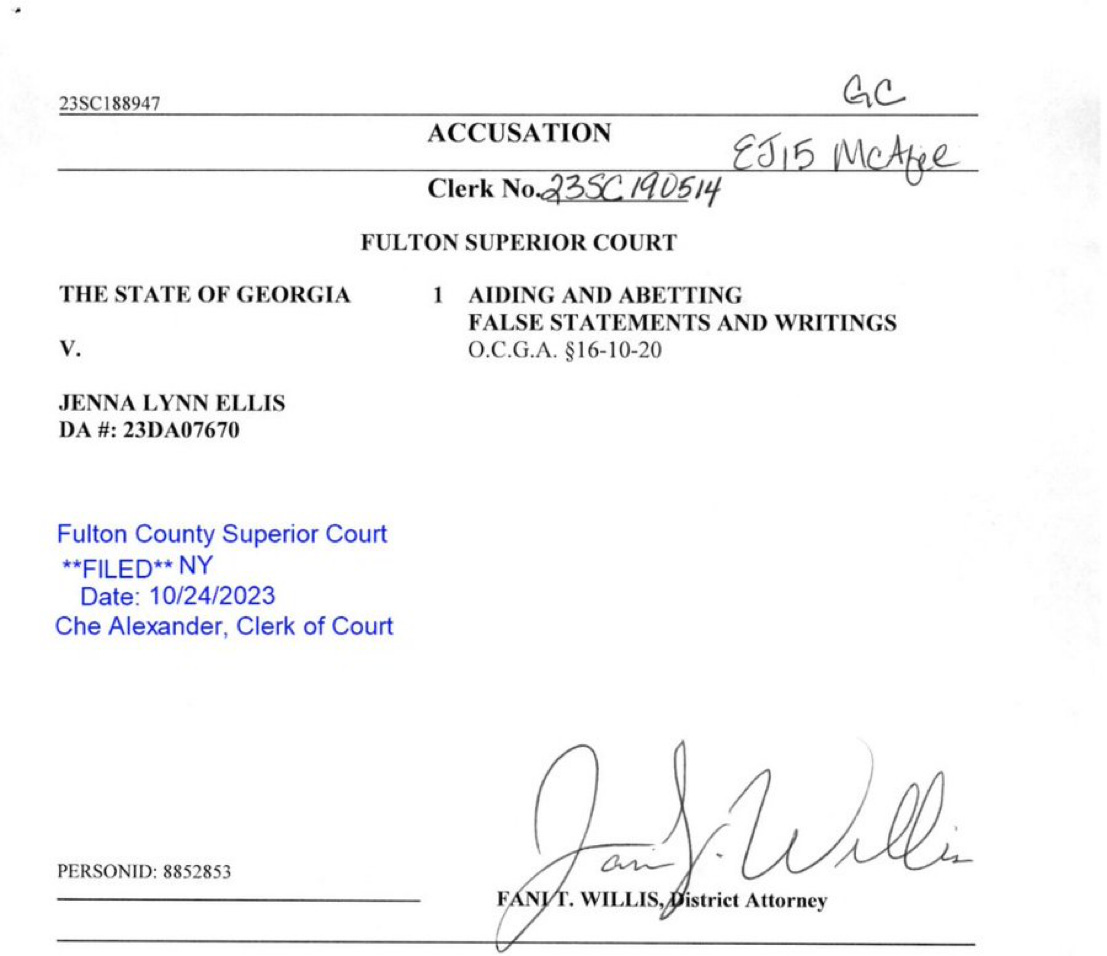
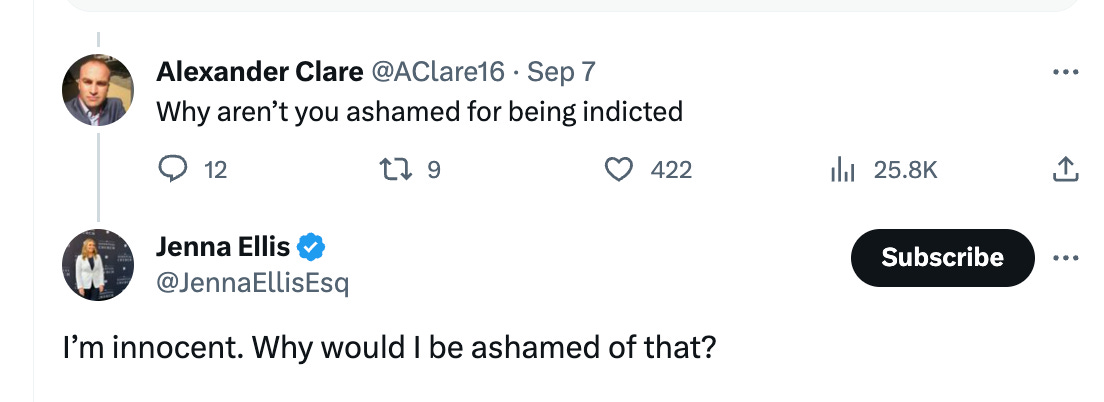
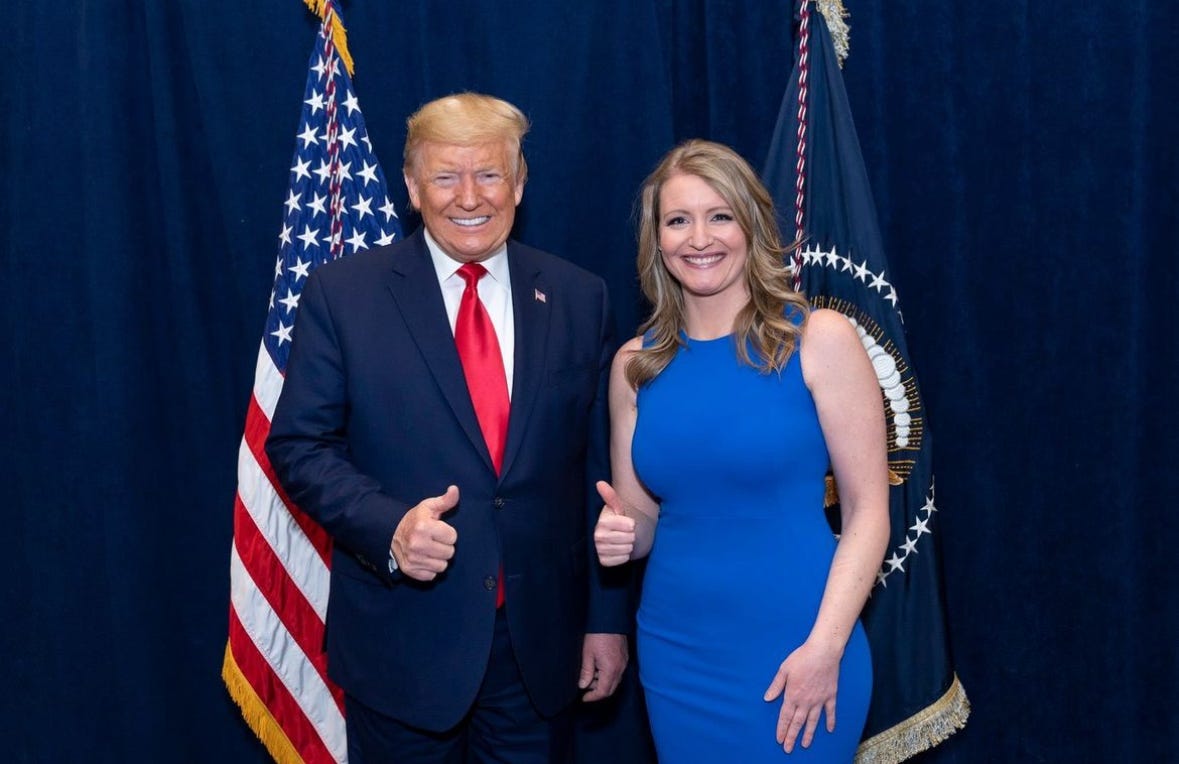



/cloudfront-us-east-2.images.arcpublishing.com/reuters/CDKUDKH2IZOB5KKQD4CKF3R6EA.jpg)
